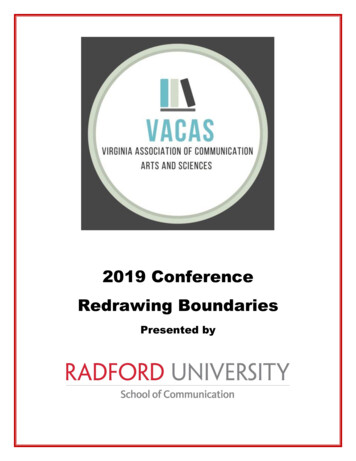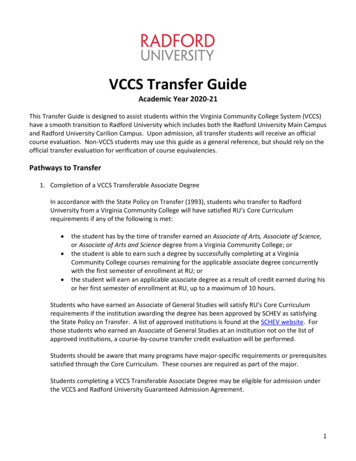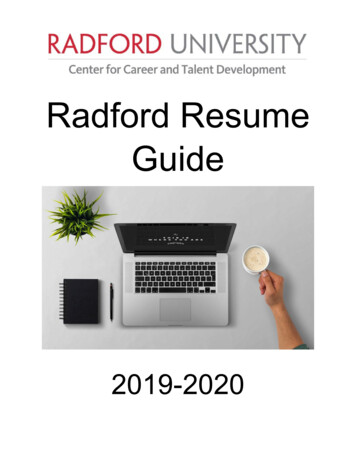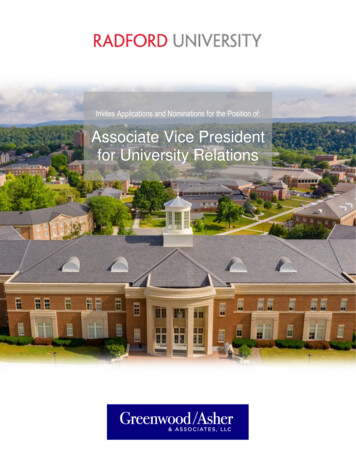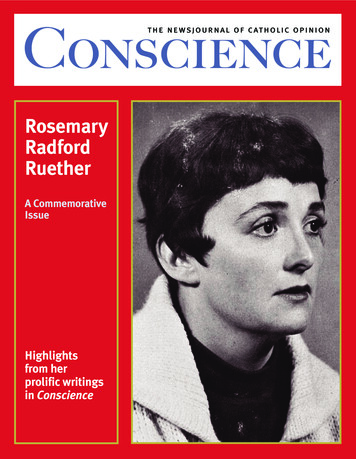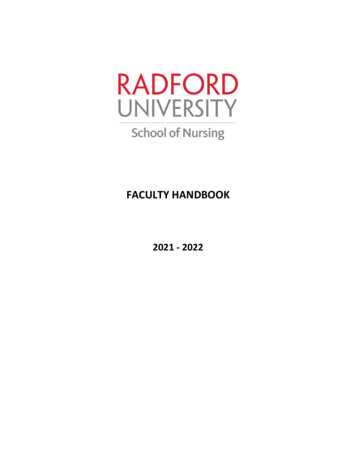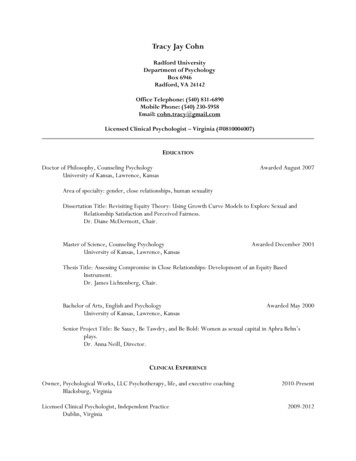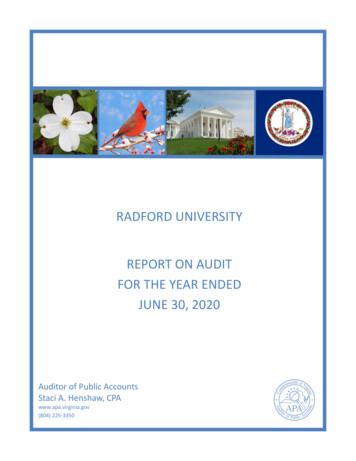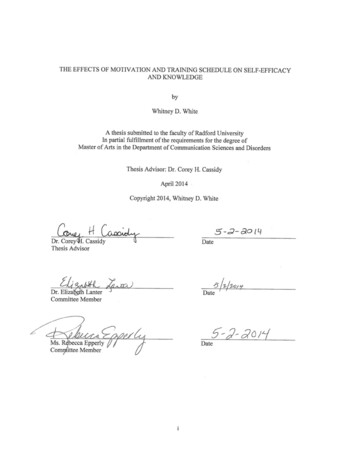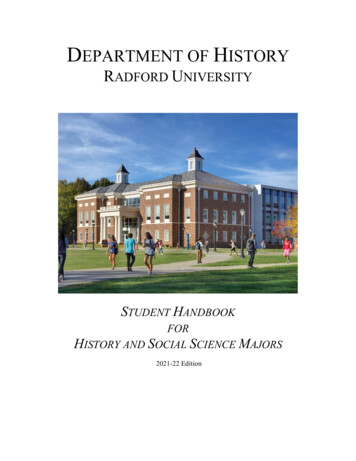
Transcription
DEPARTMENT OF HISTORYRADFORD UNIVERSITYSTUDENT HANDBOOKFORHISTORY AND SOCIAL SCIENCE MAJORS2021-22 Edition
TABLE OF CONTENTSIntroduction. 1Faculty and Staff. 2-4Academics. 5-28Advising. 5Expectations and Grading for HIST courses. 6Department of History Style Sheet. 7-8Email Etiquette. 9Taking Lecture Notes. 10-11History Major. 13-16Social Science Major. 17-25History Honors Program. 27Study Abroad. 27Internships. 27Extracurricular and Scholarship Opportunities. 28Scheduling and Registration. 29-31Graduation. 32-33Policies and Petitions. 34-37History Course Descriptions. 39-46Careers and Graduate School. 47-49
INTRODUCTIONCongratulations! You have chosen to major in History or Social Science. The primary mission of thedepartment is to provide our students with historical knowledge and skills and to train undergraduates toresearch, analyze, synthesize, and communicate conclusions about change over time by using thehistorical method. In addition, by deepening their knowledge of the past, historical studies trainindividuals to better understand the present in order to shape a better future. The Department of Historystrives to convey to all our students an understanding of the significant historical actors, events, andcultural values that have shaped the world in which we live.A degree in history opens up a wide range of career possibilities. Some careers fall within the historicalprofession, including teaching and working in archives, museums, historical sites, parks, and libraries. Forcareers in fields as diverse as law, business, government, foreign service, publishing, journalism andcommunications, a degree in history lays the foundation in research, analytic, and writing skills uponwhich later professional training can be built.Students who are primarily interested in teaching at the secondary level (grades 6-12) should major insocial science. This interdisciplinary major prepares you to teach in areas such as history, government,economics, and geography. The Social Science program is administered through the History Departmentwhose faculty act as advisors. The social science disciplines of history, political science, geography, andeconomics provide for the systematic study of human behavior and relationships across time, cultures,and space. Its broad-based, comparative approach equips students with a wide knowledge base in avariety of subject areas. The teaching licensure for this major gives students the ability and skills neededto teach in each of the disciplines that comprise the program of study.This Handbook is your guide through the labyrinth of your degree program. Keep your Handbookthroughout your association with the Department. It will help you plan your program and maintain arecord of your progress toward the degree. Reading and following its precepts does not guarantee eternalbliss; doing so, however, increases your chances of a less stressful, more successful academic experience.This Handbook surveys the academic programs, policies, and procedures in effect at the time of itspublication. Policies and procedures change; their interpretations change even more rapidly. For yourpeace of mind, review a copy of the University Catalog for the year in which you first matriculated.University Catalogs are available online through the RU Registrar’s website. While we have made everyeffort to ensure that this Handbook is in concert with the catalog, the catalog and the Registrar’sinterpretation of it is the final authority. Social Science majors should also keep current with materialsand announcements from the College of Education and Human Development.This Handbook is annually reviewed and, we hope, improved. Remember, however, that the UniversityCatalog supersedes any policies found in the following pages.
2FACULTY AND STAFFThe History faculty is dedicated to excellent teaching and solid scholarship. Every tenured or tenure-trackmember of the faculty has earned the doctorate and is actively engaged in research in his or her chosenarea of specialization. Get to know them. If you share an interest in a particular area of history with one ofthe faculty, chat with that person. You will be amazed at how much we like to talk about our specialty.StaffMs. Kimberly Lookabill, Department Administrative AssistantOffice: CHBS 4605Telephone 831-5147 email: klookabill@radford.eduThere is a reason why Ms. Lookabill is listed first. She is the glue that holds this departmenttogether. She has a wealth of information at her fingertips and is a great help to students with questions.FacultyDr. Sharon A. Roger Hepburn, Chair\Professor of History, Ph.D. University of Buffalo, 1995Office: CHBS 4603email: shepburn@radford.eduDr. Roger Hepburn’s specialties include African American History and 19th America. She teachescourses in African American History, American Slavery, and the American Civil War. Her book, Crossingthe Border: A Free Black Community in Canada (University of Illinois Press, 2007), received the 2008Albert B. Corey award jointly sponsored by the American Historical Association and the Canadian HistoricalAssociation. She is working on Dear Mother: The Civil War Letters of Private John Lovejoy Murray,Company E, 102nd United States Colored Troops, a collection of letters written by an African Americansoldier during the war. Dear Mother will be published by the University of Georgia Press in 2022. Hercurrent research project is a regimental history of the 102nd United States Colored Infantry and its serviceduring the Civil War. Dr. Roger Hepburn is the recipient of the 2010 College of Humanities and BehavioralSciences Distinguished Scholarship Award.Dr. Suzanne Ament, Professor, Ph.D. Indiana University, 1996Office: CHBS 4704email: seament@radford.eduDr. Ament is the department Russianist. She has written on music and its connection with societyin Russia and the Soviet Union in several journals, book chapters, and presentations. She is also anaccomplished singer and guitarist of Russian music. She teaches courses in world history, Russian historyand a survey of Chinese history for the department. She was awarded the prestigious Melvin Jones Awardby Lions Club International for outstanding service. You will see her around campus with her Seeing EyeDog.Dr. Brock Cutler, Associate Professor, Ph.D. University of California-Irvine, 2011Office: CHBS 4026email: bcutler2@radford.eduDr. Cutler’s current research and writing investigates the relationship between the physicalenvironment and the geography of sovereignty in nineteenth-century North Africa. Professor Cutler’sareas of interest include the modern Middle East and North Africa, environmental history, and the historyof the state. At Radford, he teaches courses in Middle Eastern/North African history, environmentalhistory, colonialism, and world history.
3Dr. Kurt Gingrich, Professor, Ph.D. Wisconsin University, 1999Office: CHBS 4615email: kgingric@radford.eduDr. Gingrich was born and raised in Pennsylvania, and he was educated at the University ofVirginia and the University of Wisconsin. A part of the Radford faculty since 2000, Dr. Gingrich offerscourses on ancient and medieval England, modern Britain, Scotland and Ireland, and Imperial India, aswell as surveys of World History. Dr. Gingrich’s research focuses on the history of the British Empireand the history of the Atlantic World. He has researched Scots’ attempts to colonize the Americas in the1600s and fissures within the early British Empire. He is currently studying environmental aspects ofBritish imperialism. Dr. Gingrich is the recipient of the 2010 College of Humanities and BehavioralSciences Distinguished Teaching Award.Dr. Garth (Mike) Montgomery, Associate Professor, Ph.D. University of Buffalo, 1993Office: CHBS 4611e-mail: gmontgom@radford.eduDr. Mike Montgomery reviews recent scholarship for the online discussion network ‘H-German’.His own research deals with the evaluation of the impact of political propaganda, and the politicalmobilization of historical education, by German educators and social scientists during the Nazi era (19331945). He was the recipient of a Fulbright Scholarship for research in Germany. Dr. Montgomeryteaches courses in modern German history, modern European history, and European intellectual history.Dr. Johnny Moore, Professor, Ph.D. University of Virginia, 1990Office: CHBS 4618email: jsmoore@radford.eduDr. Moore’s specialties include U. S. social, religious, and medical history. His book,Chiropractic in America: The History of a Medical Alternative (Johns Hopkins University Press, 1993),was the first book-length, scholarly attempt to explain how this sectarian health movement was able tointegrate itself within mainstream medical care. He is the former editor of Chiropractic History and haspublished a variety of articles and book reviews. He was the recipient of Radford University’s College ofArts and Sciences Distinguished Teaching Award for 1994-95. Currently, he is working on a history ofcelebrity in America.Dr. Mark Munzinger, Professor of History, Ph. D. University of Kansas, 2004Office: CHBS 4609email: mmunzinge@radford.eduDr. Munzinger’s area of specialization is the history of medieval Europe with a topical emphasis on legaland institutional history and a geographical emphasis on central Europe. Aside from courses in medievalhistory, he teaches the history of the ancient Near East, Greece, Rome, and early modern Europe. Dr.Munzinger’s research focuses on dispute resolution and legal culture in late medieval Poland. He haspublished on the legal and commercial aspects of German colonization in the thirteenth-century Balticand the significance of the textualization of law in later medieval Poland. Dr. Munzinger has given paperson the latter topic in Poland and the Czech Republic.Dr. Matthew Oyos, Professor, Ph.D. Ohio State University, 1993Office: CHBS 4617email: moyos@radford.eduDr. Oyos specializes in teaching courses on the history of warfare, with an emphasis on therelationship between warfare and societal change. He also offers classes on the United Statessince 1960 and modern Latin America. His research has focused on modern American militaryaffairs, and he has published on civil-military relations in the United States, the SALT II treaty, and othertopics. He examined Theodore Roosevelt’s impact on the development of a modern Americanmilitary with his study, In Command: Theodore Roosevelt and the American Military, which won theRoosevelt book prize in 2019. He is presently conducting research for a work about Roosevelt’s
4collaborators in American military reform. Dr. Oyos is the recipient of Radford University’s College ofArts and Sciences Distinguished Teaching Award for 2005-2006, and he received the DistinguishedScholar Award for the College of Humanities and Behavioral Sciences in 2019.Mr. Greg Ryder, Senior Instructor, MA, Virginia Tech, 1981Office: CHBS 4613email: jryder3@radford.eduMr. Ryder teaches American and World History Survey courses. Mr. Ryder has made teachinghistory his second career. Prior to joining the faculty at Radford University, Mr. Ryder had a 25-yearcareer in sales and management. He now enjoys “selling” history.Dr. Richard Straw, Professor, Ph.D. University of Missouri, 1980Office: CHBS 4607email: rstraw@radford.eduDr. Straw teaches courses on the American South, American Immigration, Appalachian History,Public History. His scholarly interests are in the ways that images of the past can inform our perceptionsof history and in the ways that history is presented to the general public in non-academic settings. He hasauthored three books using historical photographs in the Images of America series and is the editor ofHigh Mountains Rising: Appalachia in Time and Place. This book won the award as book of the yeargiven by the Appalachian Writers Association in 2005. He won the Donald N. Dedmon ProfessorialAward for Teaching Excellence, the University’s highest faculty award, in 2002. Dr. Straw has also beenactively involved in leading students on study abroad programs to the United Kingdom, Ireland, France,and Belgium since 1995.Emeritus FacultyDr. Charles W. McClellan, Professor Emeritus of History, Ph.D. Michigan State Univ., 1978Office: CHBS 4612email: cmcclell@radford.eduDr. McClellan retired from the department in 2006 but has continued to teach. His area ofspecialization is Africa (particularly Ethiopia), teaching two courses about that continent, along with acourse entitled Twentieth Century World. In 1988, he published Transformation and NationalIntegration: Gedeo and the Ethiopian Empire 1895-1935. Based upon two years of fieldwork, this workexplores the way in which a small scale society, the Gedeo, was incorporated into the Ethiopian state andthe political, economic, and social adaptations that were required. Dr. McClellan was advisor to VirginiaEpsilon’s chapter of Pi Gamma Mu for 26 years and served on the International Board of Trustees for thatorganization for 15 years. In 2004, he received the College of Arts and Sciences Distinguished TeachingAward and, in 2007, was named Radford University’s Outstanding International Educator.Dr. Mary Ferrari, Professor Emeritus, Ph.D., College of William and Mary, 1992Dr. Ferrari taught classes in Colonial and Revolutionary America, Virginia history, Women’sHistory, and Colonial Latin America. She published articles on various aspects of Charleston during therevolutionary period. She authored a chapter on Mary Draper Ingles for a book on Virginia women. Dr.Ferrari was the recipient of the 1999 College of Arts and Sciences Distinguished Teaching Award. Sheretired in May 2021.
5AcademicsThis section provides an overview of the academic programs of the Department of History. It alsocontains copies of the Departmental Check Sheets that you should use to record your progress toward thedegree, some hints for scheduling, some opportunities for academic enrichment, and a few suggestionsregarding study and writing skills.AdvisingYou will be assigned a history faculty member as your program academic advisor when you declare aHistory or Social Science major. Students’ advisors are listed on the student degree audit availablethrough OneCampus. You may also be assigned an advisor in the Academic Success Center who canassist in any number of functions. On issues concerning progress within your major, it is recommendedthat you see your history faculty academic advisor.Academic advising is one of the fundamental functions of the faculty besides teaching. You will need tocontact your advisor every semester to receive your PIN in order to register. Be sure to do so in a timelymanner. Each faculty member handles advising and appointments in their own way so be sure to followthe directions of your advisor. Your advisor is an invaluable resource who will assist you in navigatingthe requirements of the Department and University. Remember, though, that it is ultimately thestudent’s responsibility to ensure the fulfillment of all graduation requirements. If you are a SocialScience Teaching major, you will also need to contact the College of Education and Human Developmentfor specific advice regarding the myriad policies and procedures for navigating the State requirements forteacher certification. Our suggestion is to contact the College of Education and Human Development thesemester you enter the university or declare a Social Science major.Although all students have a faculty primary academic advisor, students would do well to remember it isyour academic career. Students should be proactive: know what your academic requirements are; knowwhat your academic progress is each semester; follow through on suggestions\advice provided by youradvisor. After all, the degree, when received, is yours. Advisors advise, students must act.The department regularly sends out bulk emails to majors on various matters. These emails often containvital information. These emails are sent to a student’s RU email address so you need to make sure thatyou regularly access your RU email account. If you use a non-RU email account be sure to have youremails from your RU email account automatically forwarded to you elsewhere. Read all emails from thedepartment carefully and follow any instructions given. The department’s communication with studentsconcerning registration, graduation applications, teacher screening, and other important issues are oftenonly sent via email.
6Expectations and Grading for Upper-Division History CoursesWelcome to your program of courses in upper-division history. These classes offer an in-depthexploration of a variety of topics. They are based on the expert knowledge of your professors and are anopportunity to immerse you in subject matter. These classes can be incredibly enriching and rewarding—and challenging. Much of how you perform at this level is up to you. After all, you should spend muchmore time outside the classroom working on course material compared to the time that you spend in class.More than ever your success is up to you, and the ability to succeed depends on your drive, yourinitiative, and your hard work.Keep in mind that each professor teaches in her or his own way. Some students like one way better. Otherstudents like a different way. Every upper-division history class will be a different experience. Some youwill doubtlessly enjoy more than others, but in every one you will learn a great deal—if you let us teachyou and if you choose to engage and learn. Generally speaking, all faculty members in the RU Historydepartment have similar expectations of students and grade on the same basic standards. We are allprobably quite similar, but you may like the subject matter of one over another or the assignments of oneover another and thus the grading “seems” different.All upper-division history courses require a significant amount of reading and writing. These are theessential tools of the historian. History is a written discipline. In order to learn it, we read. In order toexpress what we know about it, we write. If you do not like to read and/or write, then history may not theright major for you. Upper division history courses will typically have three to five books to readdepending on their length and level of difficulty. Likewise, most upper division courses will have asimilar writing load— a total of 15 to 25 pages of writing. Most 300-level HIST courses are designated“WI,” writing intensive, within the REAL Program. The assignments will vary from professor toprofessor and from course to course. Some courses may have a single large research paper. Other coursesmay have weekly writing assignments and one or more critical reading papers. Still others may haveprimary source analysis papers and critical reading papers. Most, if not all, will have essay examinations.Reading and writing are skills that need to be learned, practiced, and mastered. Writing allows us toexpress our ideas clearly and to persuade our readers that our interpretation of the past is convincing.HIST 295, the Historian’s Craft, will particularly assist you in these skills; in 300-level courses you willpractice these skills; and you will show mastery of these skills in HIST 495. The department WritingGuide provides helpful information and assistance, but the extent to which you succeed in mastering thecraft of the historian will depend on the effort that you put into it. When you graduate you can easilyconvince employers that you can read, write, and think, which is often what companies want.The Department of History has an electronic device policy. It is up to individual instructors how theyenforce this policy. “It is the policy of the Department of History that the use of electronic devices of any kind duringclass is not permitted.”The Department of History uses the \- grading system as outlined in the Undergraduate Catalog.A: 93-100A-: 90-92B : 87-89B: 83-86B-: 80-82C : 77-79C: 73-76C-: 70-72D : 67-69D: 63-66D-: 60-62F: below 60
7Radford University Department of History Style SheetOne key to writing well is writing correctly. Regardless of the strength of yourevidence and interpretations, incorrect writing obstructs communication. Only bycarefully editing and diligently proofreading your essays can you be sure that youhave written correctly. So, before submitting any essay in a history class, consultthis quick guide to history department style to make sure that your essay is writtencorrectly.1. Always be aware of and follow precisely any specific instructions issued by your instructor.2. Essays must be typed, must be double-spaced, and must have one-inch margins on each side.3. All pages after the first page must be numbered, with pagination placed top right.4. Always use 12-point Times New Roman font.5. Essays must not include blank lines between paragraphs.6. All essays must have a cover page that includes the title of the essay, your name, your instructor'sname, the course title, and the date.7. Always use footnote references.8. All essays must use proper style. Unless otherwise noted, the Radford University Departmentof History follows all rules of style set forth by the University of Chicago Press. Thus,information on such matters of style as when to capitalize words, when to italicize words, how touse quotation marks correctly, and how to write correct references and bibliographies can befound in the University of Chicago Press Manual of Style. This style guide can be consultedonline at http://www.chicagomanualofstyle.org/home.html. Every student who is a history majoror a social science major should own a copy of a useful introduction to using Chicago style,either Kate Turabian’s A Manual for Writers of Term Papers, Theses, and Dissertations or MaryLynn Rampolla’s A Pocket Guide to Writing in History.9. Always make sure that the words you use mean what you think they mean and are spelledcorrectly. The University of Chicago Press recognizes Webster’s New Collegiate Dictionary asthe dictionary of record. This dictionary thus provides definitions and spellings consideredcorrect, and if you are uncertain of how to spell a word or of what a word means, only consultingthis dictionary can provide you an authoritative answer. Every student who is a history major ora social science major should own a copy of Webster’s New Collegiate Dictionary.10. Always use correct grammar. Unless otherwise noted, the Radford University Department ofHistory follows the basic rules of grammar set forth by William Strunk, Jr., and E. B. White inThe Elements of Style. Every student who is a history major or a social science major should owna copy of Strunk and White’s Elements of Style.
811. Many common mistakes are easily avoided. A few examples follow. Never use contractions. Possessives are not contractions. Never use slang or colloquialisms. Block quotations are used for quoting material longer than five full lines of text, aresingle spaced, are indented, and are not enclosed by quotation marks. Quotation marks must always enclose shorter quotations and are almost always placedoutside of terminal punctuation. Reference numbers must be placed at the end of the each sentence (eg after terminalpunctuation and quotation marks) in which there is material drawn from a source. Failureto follow this rule is not only a breach of style but also a potential example of plagiarism. References use Hindu-Arabic numerals (1, 2, 3, etc.), not Roman numerals (i, ii, iii, etc.) Ellipsis points ( . . . ) must be used whenever material is excised from within a block ofquoted material. Ellipsis points should not be used at the beginning or ending of a blockof quoted material. Always give a person’s full name the first time you mention him or her. Subsequentreferences use only the last name. Pronouns must match their antecedents. Historians write in past tense.
9E-mail EtiquetteAppropriate professional communication is a critical skill set todevelop. E-mail correspondence should demonstrate professionalism.Think about school E-mail as a practice for how you will use E-mail in aprofessional situation.Greetings matter. Use standard greetings (Dear Hello Hi ). Beginning an E-mail to a professorwith “Hey” does not make you look good. The safest way to start is with “Dear Professor So and So”(using their last name). That way you will not be getting into the issue of whether the prof has a Ph.D. ornot, and you will not seem sexist when you address your female-professor as “Ms.” or, worse yet, “Mrs.”Make sure that your E-mail clearly identifies who you are and the class that you are in. Facultyhave multiple classes; knowing which one you are in will make it easier for an instructor to answer yourquestions promptly.Make sure that your message is clear. Be specific. You know what you are working on or thinkingabout when you write your E-mail, but the person who reads it does not know what you are thinking ifyou are not clear. Statements like “I am confused about the assignment” are often meaningless to aninstructor; he or she will not know what confuses you or even to which specific assignment you arereferring.Be courteous. This takes many forms, including using a polite and friendly tone. Do not write in alluppercase letters, which is an E-mail convention for anger or other strong emotions. Ask, rather thanmake demands of your instructors. Thank them for their time and assistance.Use diction, grammar, punctuation, and spelling appropriate to a formal situation. Everything thatyou put into writing makes an impression. Strive to make a good one. Think of this as practice forultimately working as a professional--E-mail is used in most professions now to generate and respond tomemos, and you will be judged by the impression that you make. Make an effort to write correctly and professionally with standard conventions of grammar, punctuation, and spelling(capitalization, commas, periods, and so on).Use complete sentences.Avoid slang. Do not use text, Twitter, Snapchat or other social media language.This is not Facebook. Do not write the professor in the way you would write on your friends’ wall.This is not CollegeHumor.com. Resist the temptation to talk about the “bad ass” paper you need help with or the“crappy” grade you just got on the midterm.Proofread your E-mail.Signoffs and signatures count. Always end bythanking the professor for his or her time, andclosing with “Best wishes” or “Regards” (orsome other relatively formal, but friendly,closing). Always sign with your (entire) realname.
10Taking Lecture NotesThere are several relatively easy things you can do that will put you on the road to being successful in aHistory class:1) Attend class2) Pay attention3) Take good notesTaking notes in class is important because it helps you to stay alert and focused on the class and becauseyou will walk away from the class with a fairly detailed record of what was said. Memory is imperfectand will not last long, but you will have the notes for review throughout the term. Finally, taking goodnotes will help you differentiate the more and less important and discern the instructor’s main point.Accurate notes will be helpful when you need to review material for an exam or assignment. In additionto helping you merely remember the contents of a lecture, your note taking strategy can help you grapplewith the material and more fully understand a historical topic, event, or question. Thus, you shouldconsider note taking as an interactive process rather than just a secretarial skill. It is more than simply anaid to memory. Note taking and review is part of the process of analyzing the material.Do not lean on other people for good class notes; take notes yourself. By writing things down, you takethe first step toward putting the information and ideas in your own words and making them part of yourown intellect. It is hard at first, mostly because you are trying to write down the last point whilesimultaneously listening to the next point. But keep practicing, and you will find that it gets easier.Current research supports these ideas and also shows that final results on exams and papers can beimproved if certain methods for taking notes are employed. Take notes by hand in a notebook. Significant research has demonstrated that typing notes on acomputer is less effective than writing notes by hand in a notebook. So, put your computer (andphone) away, and get out your notebook and a pen/pencil. Organization is key. Your notes should be written legibly and begin with the date and subject of thelecture. It is often best to write on every other line or to leave a large margin on at least one side ofthe page. This will allow you to add material later and to underline your notes and write addi
Dr. Brock Cutler, Associate Professor, Ph.D. University of California-Irvine, 2011 . Office: CHBS 4026 email: bcutler2@radford.edu . . He is the former editor of Chiropractic History and has published a variety of articles and book reviews. He was the recipient of Radford University's College of
